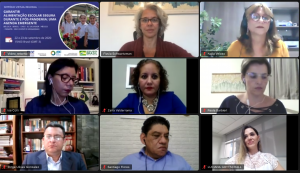Governments and experts share actions to ensure food and nutrition security through school feeding during the pandemic
The Governments of Belgium, Brazil, Chile, El Salvador, Mexico, Panama and Saint Vincent and the Grenadines share experiences to guarantee school feeding during the pandemic and promote food and nutrition security protocols post-COVID-19.

Brasília, September 29, 2020 - More than three thousand spectators participated in the two-day Regional Virtual Symposium: Ensuring safe school feeding during and after the pandemic: an emerging agenda. On September 22nd and 23rd, representatives of governments and experts from the region presented their strategies to guarantee school feeding programmes during the pandemic and the safe return of children to schools. The Governments of Belgium, Brazil, Chile, El Salvador, Mexico, Panama and Saint Vincent and the Grenadines were invited to share their experiences during the pandemic.
FAO Regional Programme Officer for Latin America and the Caribbean, Maya Takagi, said that school feeding programmes have the enormous challenge of recovering education, maintaining a learning process, and fighting hunger and COVID-19, simultaneously. "School feeding programmes show that it is possible to continue fighting hunger in the region," she said.
Paola Barbieri, Project Analyst of the Brazilian Cooperation Agency of the Ministry of Foreign Affairs (ABC/MRE), highlighted the importance of the event: “we all need to seek creative and agile solutions to face this great challenge caused by this pandemic, which affects our society, our health, our economy and, in our specific case, the diets of thousands of students. This moment forces us to work even harder”.
Healthy eating in the pandemic period
Representatives from Chile, Panama and Saint Vincent and the Grenadines shared some of the actions being taken by the countries to promote healthy eating during the pandemic. In Saint Vincent and the Grenadines, the strategy of using family gardens to promote food and nutrition security was highlighted as an integral across many communities during the pandemic. In Chile, the distribution of over 14 million food baskets has helped in ensuring that students and their families are able to meet the basic food and nutrition requirements for a balanced diet. While in Panama, the Study without Hunger programme has been key in educating students on food and nutrition and healthy eating.
Post-pandemic food and nutrition security protocols
As a part of the post-COVID-19 planning, representatives from Brazil, El Salvador, Mexico and Belgium shared several protocols to ensure food and nutrition security. Biosafety protocols in Brazil were presented as a guide for the return to school, supported by students’ access to adequate food purchased from local family farmers. In El Salvador, school meals will be reinstated as students return to schools with face-face and virtual classes while in Mexico, restrictions on the sale of sodas and junk food have already been implemented. In Beligium, with schools already reopened, there are new health standards, increased frequency of school cleaning and a colour coded system for the return to classes. The colour coded system applies the Yellow or Orange code, with the former for face-to-face clsses from Monday to Friday with everyone wearing masks and the latter activated in critical cases of COVID-19 in a municipality or school, where classes will be face-to-face and virtual.
Najla Veloso, Coordinator of the project Consolidation of School Feeding Programs in Latin America and the Caribbean praised the measures being taken by the countries to ensure food and nutrition security for students. She highlighted that ensuring psychosocial care for students and their families, food handlers, teachers and farmers; intersectoral coordination to offer quality food in safe conditions; the planning and execution of broad and efficient communication strategies; the adoption of biosafety measures and the promotion of trainings to professionals to ensure their health were integral as the pandemic continued.
The symposium was organized by the Sustainable School Feeding Network (Red de Alimentación Escolar Sostenible-RAES), which is promoted by the Government of Brazil, represented by the Brazilian Cooperation Agency of the Ministry of Foreign Affairs (ABC / MRE) and the National Fund for Education Development (FNDE), with the support of the Food and Agriculture Organization of the United Nations (FAO).
